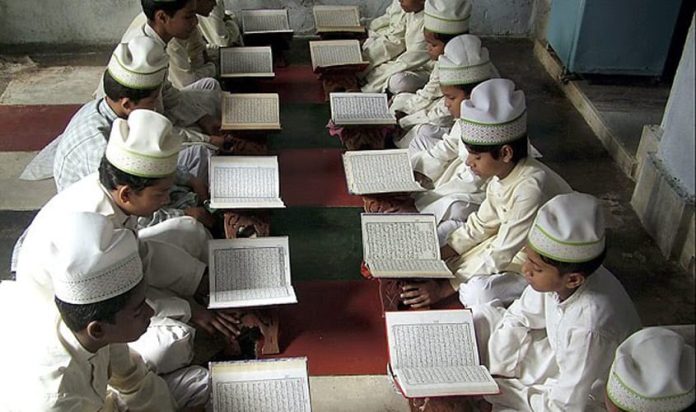– Ayesha Sultana
The debate over madrasa education in India has intensified following the Lucknow bench of the Allahabad High Court’s ruling on March 22, 2024. The court declared the Uttar Pradesh Board of Madarsa Education Act, 2004, as “unconstitutional and violative of secularism.” This judgment raises concerns about the discriminatory perspective often directed towards the Muslim community and its educational institutions. Despite the vital role madrasas play in educating marginalized Muslim populations, the current government seems more focused on vilifying these institutions than on supporting them.
The Allahabad High Court’s ruling, delivered by Justices Vivek Chaudhary and Subhash Vidyarthi, argued that the state cannot create a separate board for religious education for one specific faith. The judgment stated, “The State cannot discriminate and provide different types of education to children belonging to different religions.”
However, this notion of “secularism” is questionable when considering the government’s apathy towards enhancing educational infrastructure for Muslims. The decision appears less about upholding secularism and more about undermining a key aspect of Muslim education. Fortunately, the Supreme Court stayed this ruling on April 5, 2024, with Chief Justice DY Chandrachud leading the bench.
The National Commission for Protection of Child Rights (NCPCR) further complicated matters by challenging the High Court’s decision. On September 11, 2024, the NCPCR filed an affidavit questioning the effectiveness of madrasa education and claiming it violated the Right to Education Act of 2009. This criticism overlooks the essential role madrasas play, particularly in rural and underserved Muslim communities where state-run schools are either non-existent or in poor condition.
Government Inaction Under the Facade of Reform
The Modi government frequently claims to be reforming the education system, especially regarding madrasas. Prime Minister Narendra Modi has repeatedly spoken about “modernizing” these institutions to better prepare students for today’s job market. However, this rhetoric often fails to translate into tangible support for madrasas. Instead, the government’s focus seems to be on portraying madrasas as outdated and in need of strict regulation rather than providing necessary assistance.
This narrative ignores the historical significance of madrasas in India and their role in promoting literacy among Muslims, particularly lower-income groups. Madrasas have long provided free education that integrates Islamic values with basic literacy. These institutions have evolved to include subjects like Arabic, Shariah (Islamic law), Tafsir (Quranic interpretation), and logic. Despite their contributions, madrasas are now under attack, with allegations of radicalization – a narrative fueled by the current political climate.
Rather than supporting madrasas, the BJP-led government has targeted Muslim institutions, exacerbating their challenges. The Uttar Pradesh Board of Madarsa Education Act, which was supposed to improve educational standards through structured curricula and exams, has been undermined by the government’s policies and actions. Instead of facilitating modernization, these policies have often added to the difficulties faced by madrasas.
The Vital Role of Madrasas in Filling Educational Gaps
Criticism of madrasa education frequently overlooks the harsh realities faced by many Muslim communities. In states like Uttar Pradesh and Bihar, government schools are often dysfunctional or absent, making madrasas the only educational option available. According to a 2018-2019 study, India has over 24,000 madrasas, with nearly 5,000 unrecognized. These institutions operate with minimal funding, relying heavily on donations and community support, and often lack basic facilities such as clean water, sanitation, and proper infrastructure. Yet, they continue to serve hundreds of thousands of students due to the government’s failure to provide adequate alternatives.
For many Muslim families, particularly in rural areas, madrasas are the sole source of education in the absence of effective government schools. For decades, madrasas have offered a critical educational refuge, especially where public schools are underfunded or in disrepair. Rather than acknowledging these systemic failures, the government continues to scapegoat madrasas.
The argument that madrasas are outdated and fail to meet modern educational standards reflects the state’s unwillingness to offer meaningful support. The Union government has promised reforms through initiatives like the Scheme to Provide Quality Education in Madrasas (SPQEM), introduced in 1993. This scheme aimed to integrate modern subjects such as English, Mathematics, and Science, but has seen limited effective implementation. Successive governments, including the current administration, have failed to ensure that madrasa students receive the comprehensive education they deserve.
Modernization Without Support: A Flawed Narrative
While the government claims to support modernization, its approach reveals a deeper agenda: to undermine madrasas and, by extension, Muslim communities. Prime Minister Modi’s government continues to criticize madrasas for their religious-focused education while neglecting the necessary support for their development. The very system the government criticizes is one it has failed to support adequately.
The lack of teacher training and modern educational frameworks in madrasas are often cited as reasons for reform. According to the Ministry of Education, only 8% of madrasa teachers are trained, compared to 87% in state-run schools. However, it is the government’s responsibility to provide support, resources, and training. Instead, the government has opted to vilify madrasas, portraying them as relics while providing scant support for their development.
Modernization of madrasas cannot happen in isolation. The state must take responsibility and offer real support – financial, educational, and infrastructural – rather than relying on empty promises. Without government intervention, the burden of modernization falls entirely on madrasa communities, who are already grappling with limited resources.
Wrapping up
The ongoing criticism of madrasas by the Modi government is less about improving education and more about targeting Muslim institutions. Despite their crucial role in educating underserved communities, madrasas are unfairly maligned. Instead of using these institutions as a political tool, the government should address the broader issue of educational inequality. Real reform will only be achieved when the state provides genuine support, rather than leveraging madrasa education to demonize Muslims.
Madrasas have been vital to Islamic education for generations. While modernization is necessary, it should not come through forceful criticism. The future of these institutions depends on collaborative efforts, not condemnation, and the state must acknowledge its role in ensuring quality education for all its citizens, regardless of their faith.




